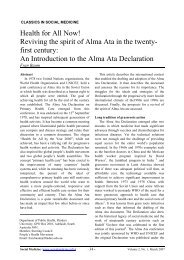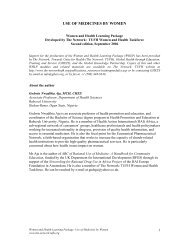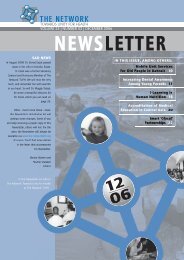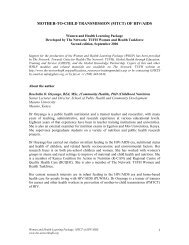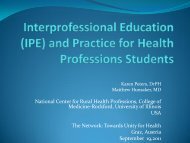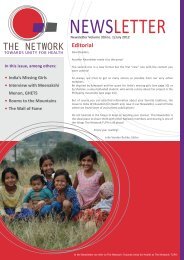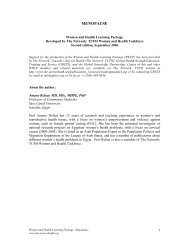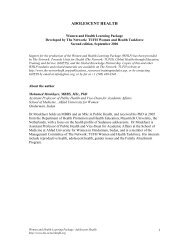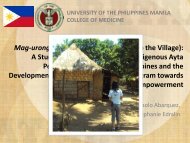Tamas Fülöp Award - The network - Towards Unity For Health
Tamas Fülöp Award - The network - Towards Unity For Health
Tamas Fülöp Award - The network - Towards Unity For Health
Create successful ePaper yourself
Turn your PDF publications into a flip-book with our unique Google optimized e-Paper software.
Embedding Indigenous<br />
Perspective in <strong>Health</strong> Curriculum<br />
With the health of Australia’s Indigenous<br />
development of media-based learning<br />
peoples amongst the worst in developed<br />
resources within selected units, integration<br />
nations, and the health disadvantage of<br />
of Aboriginal and Torres Strait Islander per-<br />
Student learning has been impacted posi-<br />
Indigenous Australians so devastatingly<br />
spectives within assessment in theory and<br />
tively across 26 units at both undergraduate<br />
apparent, the importance of appropriate<br />
practicum units, and self assessment activi-<br />
and postgraduate levels, with over 7,700<br />
training for health professionals has never<br />
ties for students to reflect on their learning.<br />
students each year enrolled in the units that<br />
been more salient.<br />
<strong>The</strong> Yapunyah Project reflects an explicit<br />
have been redeveloped to include Indigenous<br />
strategy to systematically promote students’<br />
perspectives. <strong>The</strong> self awareness and per-<br />
<strong>The</strong> Yapunyah Project was an initiative of the<br />
understanding and appreciation of<br />
sonal development that students experience<br />
Faculty of <strong>Health</strong> at the Queensland<br />
Aboriginal and Torres Strait Islander per-<br />
through their engagement in the learning<br />
University of Technology, instigated as a<br />
spectives and competence in providing cul-<br />
activities of the programme provide a basis<br />
result of ethical, clinical, accreditation, and<br />
turally safe healthcare to health consumers<br />
for their learning outcomes beyond gradua-<br />
regulatory imperatives to develop cultural<br />
of Indigenous backgrounds. <strong>The</strong> project<br />
tion and into their professional lives. This has<br />
competence in health graduates with respect<br />
aimed to facilitate the development of pro-<br />
been facilitated by the integration of the<br />
to Aboriginal and Torres Strait Islander perspectives.<br />
<strong>The</strong> project was guided by earlier<br />
reforms in health curricula by the Committee<br />
of Deans of Australian Medical Schools and<br />
the Royal Australian College of General<br />
Practitioners, and by the cultural competence<br />
in healthcare delivery models of Campinha-<br />
Bacote (1998) and Cross, Bazron, Dennis &<br />
Isaacs (1989). It was also informed by the<br />
cultural safety reforms to health curricula in<br />
New Zealand.<br />
<strong>The</strong> Yapunyah Project involved extensive<br />
consultation and collaboration with<br />
Indigenous staff and health experts in the<br />
local Aboriginal and Torres Strait Islander<br />
community, and it carefully constructed a<br />
core curriculum and associated graduate<br />
capabilities. <strong>The</strong> overall project involved<br />
incorporation of Indigenous perspectives<br />
across four major undergraduate courses in<br />
the Faculty of <strong>Health</strong> (Nursing, Psychology<br />
and Counselling, Public <strong>Health</strong>, and Human<br />
fessional competencies that are fundamental<br />
to the provision of care that promotes<br />
optimal health outcomes for Aboriginal and<br />
Torres Strait Islander people.<br />
This project took a ‘whole of course’<br />
approach to the development of cultural<br />
competency in the health disciplines, and<br />
was implemented across first, second and<br />
third year units within four major undergraduate<br />
courses in the Faculty of <strong>Health</strong>.<br />
<strong>The</strong> goal was to move beyond a ‘good citizenship’<br />
model of Indigenous knowledge to<br />
one of professional competence in students.<br />
A crucial feature of the Yapunyah Project<br />
was the embedding of learning activities,<br />
including assessment, within curricula.<br />
Key elements of the programme included:<br />
• the explicit identification of expected<br />
learning outcomes and competencies;<br />
• the incorporation of Indigenous content<br />
and learning activities within a large num-<br />
clinical/practicum environment within the<br />
Yapunyah Project, whereby cultural competency<br />
is built into clinical units and clinical<br />
assessments. <strong>The</strong> project has also succeeded<br />
in enhancing the experience of Aboriginal<br />
and Torres Strait Islander students with<br />
respect to health courses and creating a<br />
positive impact on all graduates’ interest in<br />
and opportunities for employment in the<br />
area of Indigenous health. <strong>The</strong> continued<br />
and sustained work that has arisen from the<br />
Yapunyah project prepares our graduates to<br />
be proactive in working to improve the<br />
health status of Indigenous Australians.<br />
References<br />
CAMPINHA-BACOTE, J. (1998). <strong>The</strong> Process<br />
of Cultural Competence in the Delivery of<br />
<strong>Health</strong>care Services (3 rd ed.). Cincinnati,<br />
OH: Transcultural C.A.R.E. Associates.<br />
CROSS, T., BAZRON, B., DENNIS, K., &<br />
ISAACS, M. (1989). <strong>Towards</strong> a Culturally<br />
Competent System of Care. Washington, DC:<br />
J U L Y 2 0 0 8 N E W S L E T T E R N U M B E R 0 1 | V O L U M E 2 7<br />
Movements) and one biomedical unit offered<br />
ber of selected units;<br />
Georgetown University Child<br />
by the Faculty of Science. <strong>The</strong> experience has<br />
• the integration of Aboriginal and Torres<br />
Development Centre, CASSP Technical<br />
been a challenging and positive one, and the<br />
Strait Islander perspectives within assess-<br />
Assistance Centre.<br />
reforms have been supported by a sustain-<br />
ment in theory and practicum units;<br />
able framework.<br />
• the development of a purpose-built web-<br />
Robyn Nash, Sandra Sacre and Beryl<br />
site and media-based learning resources<br />
Meiklejohn | Faculty of <strong>Health</strong>,<br />
Key elements of the strategy included the<br />
for use across the faculty and in specific<br />
Queensland University of Technology,<br />
explicit identification of expected learning<br />
units; and<br />
Australia<br />
outcomes, the streamlining of content/<br />
• tutorial and self assessment activities for<br />
Email: s.sacre@qut.edu.au<br />
learning activities within selected units, the<br />
students to reflect on their learning.<br />
21



